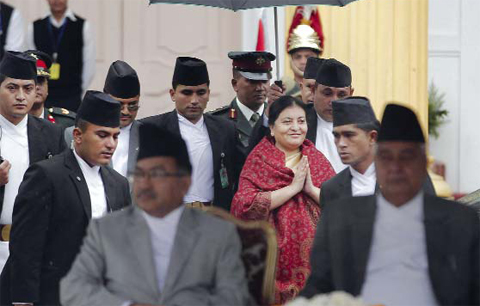 Nepal’s newly elected president Bidhya Devi Bhandari (center) arrives to take oath in Kathmandu yesterday. Nepalese lawmakers elected a longtime women’s rights campaigner to become the country’s first female president Wednesday as the Himalayan nation pushes for more gender equality in politics and work life. —AP
Nepal’s newly elected president Bidhya Devi Bhandari (center) arrives to take oath in Kathmandu yesterday. Nepalese lawmakers elected a longtime women’s rights campaigner to become the country’s first female president Wednesday as the Himalayan nation pushes for more gender equality in politics and work life. —AP
KATHMANDU: Fuel-starved Nepal has signed an agreement with China to import gasoline, diesel and cooking gas, effectively ending a monopoly on supply from India, which has restricted fuel convoys as a result of political protests in the Himalayan nation.
The decision to import Chinese oil amid severe shortages has brought China a step closer to Nepal, which traditionally is more influenced by India in the south. The two Asian giants have been jostling for influence in landlocked Nepal.
Nepal sent a team of officials this week to Beijing, where they signed a memorandum of understanding Wednesday with China National United Oil Corp, said Nepal Oil Corp official Deepak Baral.
Details on how much fuel Nepal will receive, prices and other arrangements still need to be worked out, Baral said, but he confirmed the supply would be on a regular basis. It would be the first time for Nepal to import Chinese fuel. It has so far relied exclusively on India for its energy needs.
Indian External Affairs Ministry spokesman Vikas Swarup declined comment on Nepal's agreement with China. An Indian Oil Corp. official said he did not know what Nepal and China were agreeing to, but that Indian supplies were moving again, with 35-40 percent of normal shipments sent into Nepal over the past few days. The official spoke on condition of anonymity because he was not authorized to speak with reporters.
India usually sends 100,000 tons of fuel every month, including diesel, kerosene and LPG, aboard trucks sent by Nepal.
Weeks of violent protests by ethnic Madhesis against the newly adopted Nepalese Constitution have blocked the main border crossing between Nepal and India and severely strained the traditionally close ties between the two Hindu-majority nations. While other border crossings were free of protests, India did not use them to deliver fuel or other key supplies including medicine and food.
New Delhi has demanded that Nepal guarantee more rights for traditionally marginalized ethnic groups. The protesters want a bigger state than they were given in the new constitution and more government positions and seats in parliament.
No agreement was reached in talks yesterday between the government and the main protesting group. They are to meet again on Sunday. The halt in fuel shipments has also jeopardized Nepal's efforts to rebuild and recover after a set of massive earthquakes in April and May destroyed hundreds of thousands of homes nationwide and left thousands dead. Aid groups have said that, without enough fuel, they've been unable to deliver food, blankets and other supplies to remote areas now threatened by the coming winter weather. China has shown keen interest in recent years in investing in Nepal, according to Investment Board Nepal.
Earlier this week, China announced it would give Nepal 1.3 million liters (340,000 gallons) of gasoline to help ease the shortages. The fuel, which is expected to reach the capital by early next week in about 100 tanker trucks, would normally be enough for four days but will be rationed for vehicles.
Bringing in fuel from China is a logistical challenge. The border runs along the world's highest mountains and the two crossings were damaged by the earthquake in April. Only one has reopened this month.
"This shipment is only a token from China, but commercial import is not practical right now because there is no infrastructure or equipment available at this border point to transfer fuel," said Keshav Poudel, editor of the Spotlight news magazine. He said the road is so narrow at some points that only one vehicle can squeeze through at a time.
Nepal imported about 1.37 billion liters (360 million gallons) of fuel last year from Indian Oil Corp. at a cost of $1.05 billion. The two sides also signed a deal in August to build a 41-kilometer (26-mile) pipeline connecting two border storage facilities.
Last year, Indian companies signed agreements to build two hydropower plants worth $2.2 billion, while a Chinese company is finalizing a deal to build another plant for $1.5 billion. - AP




